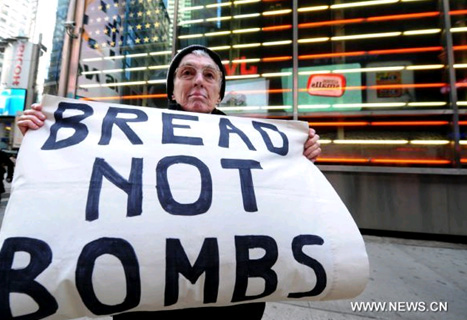Nearly a decade after the U.S. invasion of Iraq, the country has gone through a civil war and a major transformation from strongman state to fledgling democracy.
Finally Iraq is starting to pick up the pieces, but the violence continues, and foreign investors remain wary, experts noted.
The nation's energy economy is recovering slowly, but is far from rivaling oil giant Saudi Arabia in terms of production. And while Iraq has begun the process of settling matters through politics rather than violence, some analysts predict that the withdrawal of U.S. forces will leave a regional power vacuum. Overall, the country holds promise, according to some experts, although challenges abound.

A protestor holds a placard during an anti-war rally to commemorate the 8th anniversary of the Iraq War at the Times Square, New York, the United States, March 19, 2011. (Xinhua/Shen Hong)
Michael O'Hanlon, senior fellow at the Brookings Institution, said Iraq is still at a fairly early level of recovery from its civil war.
"Make no mistake about it. If you look at the casualties from violence, Iraq is still comparable to Afghanistan today," he said. "That's counter- intuitive to most people, who think of Afghanistan as going up in flames and Iraq as settling down. But in fact, while Iraq's violence is 90 percent reduced from what it used to be, it's still much higher than most of the region."
As a result, oil investment is lagging, and Iraq remains one of the Persian Gulf's poorer countries, some experts said.
Indeed, the economy's rudimentary state suggests the possibility for problems down the road, as Iraqis expect a better quality of life, and it remains unknown how long they will be content with their current government, O'Hanlon said.
"I could see people getting really impatient if the quality of the economy doesn't improve," he said.
A RETURN OF STRONGMAN STATE?
Another question hovering over Iraq is weather the country could once again become a strongman state.
O'Hanlon said Iraqi Prime Minister Nouri al-Maliki has already shown that he could move toward usurping more power to his office. Nevertheless, many of Iraq's political parties are independent of al-Maliki, and he is unlikely to retain his office beyond this term.
"My guess is that whatever temptation he has to take more power will be checked by the fact that his hold on that position is probably not one that can be sustained forever," he said.
A COMING POWER VACUUM?
Nathan Hughes, director of military analysis at global intelligence company Stratfor, said that while the United States wanted to install a pro-American democratic government, the country has become almost a base of operations for Iran to project influence across the region.
And with the United States now drawing down in Iraq, that will leave a power vacuum, as Iraq and Iran have in the past kept each other in check, he said.
Still, some argue that no neighboring state will impose its will on Iraq, although foreign influence could deepen as U.S. forces withdraw.
In a piece in the New York Review of Books, Joost Hiltermann, the Middle East and North Africa deputy program director at the International Crisis Group, listed a number of instances in which foreign powers have tried and failed to exert influence over Iraq.
In 2008, for example, Iran failed to prevent the U.S.-Iraq security agreements from being signed, despite its many summons of Iraqi leaders to Tehran, he noted in an article entitled "Iraq: The Impasse."
In December 2009, Iranian soldiers occupied a well in an Iraqi oil field near Iran's border, raising the Iranian flag and claiming the well was their territory, he noted.
That outraged Iraqi politicians, as well as leaders of the Islamic Supreme Council of Iraq, which is often accused of being an Iranian proxy, he wrote.
HOW LONG WILL U.S. FORCES REMAIN?
When U.S. forces hit Iraq with the shock and awe campaign in March 2003, the administration of former President George W. Bush thought the task would be quick and relatively painless, having failed to predict the guerilla and civil wars that would engulf the country for the next several years.
U.S. military deployments peaked in 2007 at 166,000, and nearly 50,000 remain in the war torn country. The U.S. military has seen nearly 5,000 troop casualties in a war that officially cost 750 billion U.S. dollars, although some estimates put that number at 3 trillion U.S. dollars.
U.S. forces officially handed over security duties to Iraqi forces this past summer, but thousands of U.S. troops remain in the Iraq. And while the bulk of U.S. forces are expected to withdraw by the end of this year, a yet unspecified number are likely to remain.
Some observers, officials and experts fret the fledgling democracy could unravel if U.S. forces are not present to bolster it, although Iraqi sentiment is said to be strongly against the presence of foreign forces in the Mid Eastern nation.
Xinhua


























